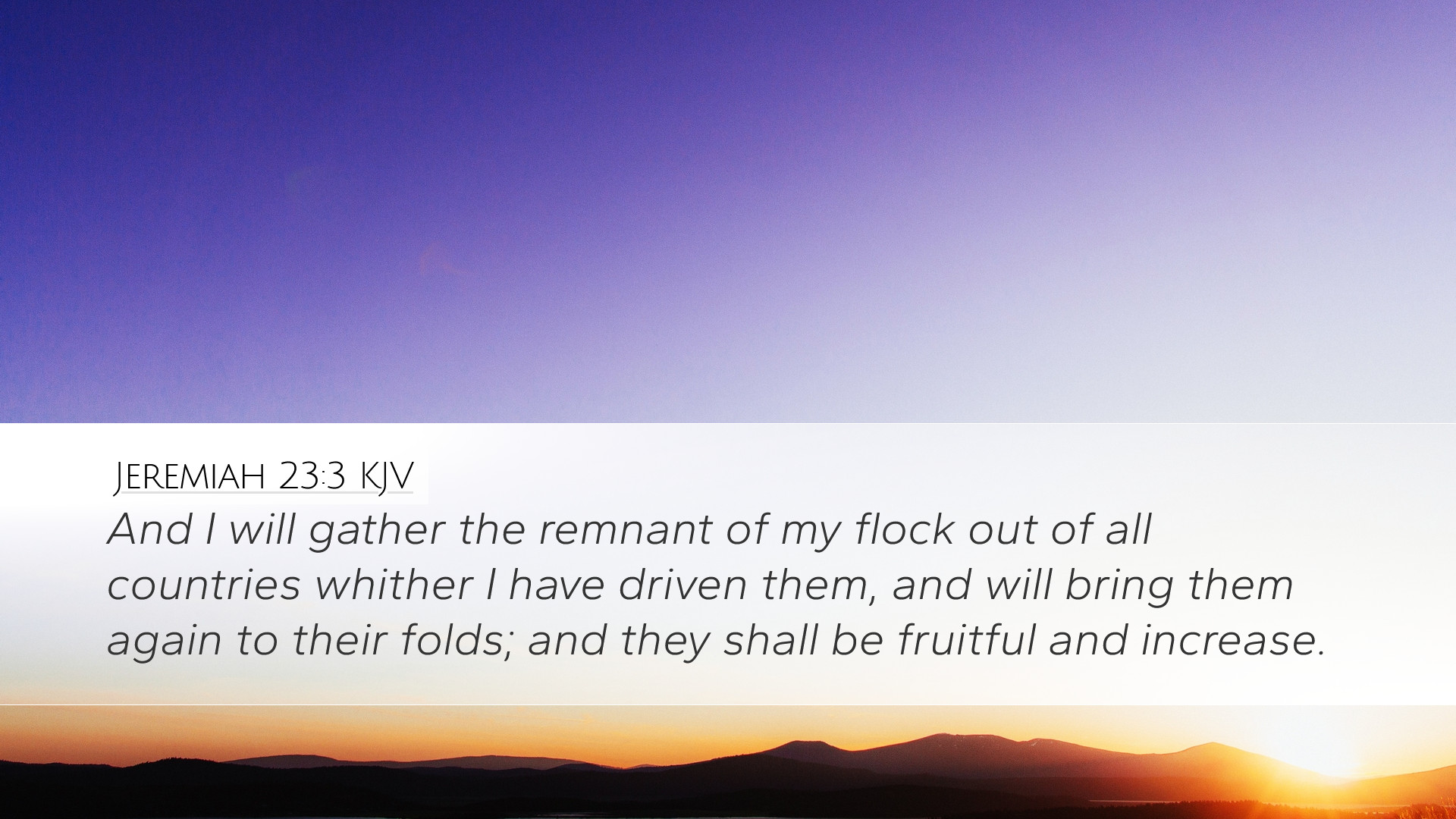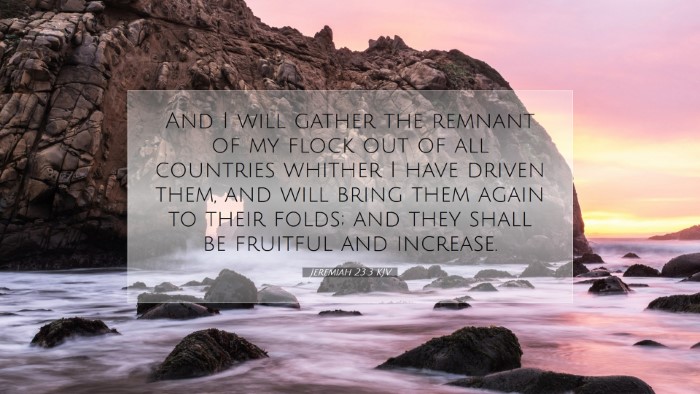Commentary on Jeremiah 23:3
Verse: "And I will gather the remnant of my flock out of all countries whither I have driven them, and will bring them again to their folds; and they shall be fruitful and increase."
Introduction
This passage from the Book of Jeremiah reveals God's promise to restore His people who have been scattered due to their disobedience and sin. This theme of restoration is central not only to Jeremiah's message but to the broader narrative of Scripture. Various commentators provide rich insights that illuminate the significance of this verse for understanding God's character, His covenantal faithfulness, and His plans for His people.
Contextual Background
Jeremiah prophesied during a tumultuous time in Judah's history, characterized by political instability, moral decay, and impending judgment. The scattering mentioned in this verse refers to the Babylonian exile, where many of the people were forcibly taken from their homeland. This gathering of the remnant points to God's overarching redemptive plan, signifying hope for restoration amidst despair.
Theological Insights
In examining Jeremiah 23:3, several theological themes emerge, notably the reassurance of God's sovereignty and mercy:
- Divine Sovereignty: God asserts His authority in gathering His people, demonstrating that no power can thwart His will. This gathering is a divine initiative, reminding believers that reliance on God's plans surpasses human endeavors.
- Covenantal Faithfulness: God's promise to gather His flock is anchored in His covenant with Israel. This reflects His enduring commitment to fulfill His promises even when His people fail to uphold their end of the covenant.
- Hope for the Remnant: The reference to the 'remnant' highlights God's grace. Despite the overwhelming judgment that befalls the majority due to disobedience, a faithful remnant remains under God's protection, allowing for future restoration.
Commentary Insights
Matthew Henry
Matthew Henry emphasizes the compassionate nature of God as the Shepherd who seeks out His lost sheep. He notes that despite the devastation faced by the people of Israel, God's initiative to gather the remnant showcases His love and mercy. Henry also observes that this restoration comes with a promise of fruitfulness and increase, signifying both spiritual and physical blessings. He conveys that this gathering is not merely about bringing people back to a geographical location, but restoring their relationship with God and revitalizing their faith.
Albert Barnes
Albert Barnes offers a deep dive into the context of the verse, suggesting that the 'flock' represents the true followers of God who have remained loyal amidst widespread infidelity. Barnes interprets the phrase "I have driven them" as God's active role in the discipline of His people due to their rebellion. He highlights that the restoration involves not just a physical return but also an essential renewal in spiritual fidelity. He encourages readers to understand that even severe discipline can lead to God's ultimate purpose of bringing His people back into faithful communion with Him.
Adam Clarke
Adam Clarke presents a scholarly exploration of the text, focusing on the prophetic aspect of the gathering. He posits that the 'cities' and 'folds' mentioned in the verse symbolize various aspects of community and governance. Clarke connects this gathering with the New Testament's fulfillment in Christ, asserting that Jesus embodies the Good Shepherd who lays down His life for His sheep. He delicately balances the themes of judgment and hope, indicating that God's intention to restore does not diminish the reality of sin but instead magnifies His grace and the transformative power of repentance.
Applications for Pastors and Theologians
Jeremiah 23:3 serves as a profound reminder for pastors and theologians regarding the nature of God’s relationship with humanity, especially in ministry contexts:
- Emphasizing God's Mercy: Pastors are encouraged to preach a message of hope and restoration, reflecting God's character of mercy and the possibility of repentance for those who have strayed.
- Understanding Discipline: The importance of divine discipline in the life of the believer can be a crucial teaching point, conveying that God’s actions, even in judgment, are ultimately aimed at restoration.
- Community and Belonging: The drawing together of the remnant can encourage church leaders to work towards unity and cohesion within the church, recognizing the need for community and support during times of trial.
- Evangelistic Hope: This verse can inspire evangelistic efforts, as it encapsulates the idea that God is actively seeking out His people—encouraging ministries that reach out to the lost and marginalized.
Conclusion
Jeremiah 23:3 provides profound theological depth and rich pastoral application. By understanding the context, the character of God, and His unwavering commitment to His people, pastors, students, and theologians alike can find clarity and encouragement in this verse. It serves as a testament to God’s grace and a reminder of His powerful ability to gather and restore His flock, even in the midst of trials and tribulations.


